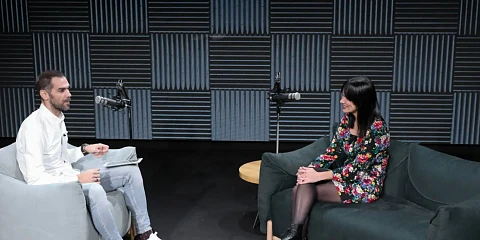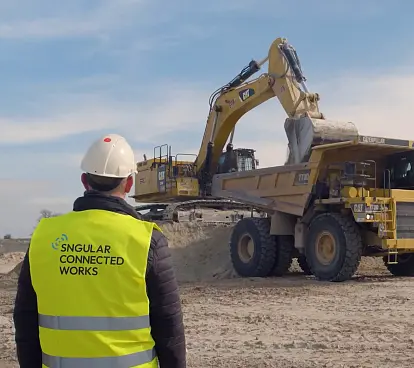
Separating technology fads from trends. Marta del Amo visits UNIQ
April 12, 2022
In the eighth edition of UNIQ, José Manuel Calderón sat down in the studio to talk to Marta del Amo. One of Spain's leading science journalists, she has been the chief editor of the Spanish edition of the MIT Technology Review for the last five years.
Her reporting career began more than 10 years ago, and it has taken her through the halls of the digital daily Público and the communications department of CSIC, Spain's largest public research institution. Her talent and perseverance have also made her a popular collaborator with other Spanish media including PlayGround, El Español and Muy Interesante. Likewise, she has become a highly demanded public speaker, moderating and leading discussions hosted by major Spanish companies and the Spanish Science Ministry.
The conversation resulted in something of a masterclass. Marta was captivating as she shared her vision and knowledge about some of the technologies with major societal impacts like quantum computing, robotics and Big Data.
Fads versus trends
As a science journalist, one of her main tasks is separating technology fads from trends. She shares her simple formula for doing so: trends fundamentally change society, whereas fads come and go leaving little trace.
"I always use the example of an iPhone. The first iPhone was a genuine technological innovation because it changed how we operated in our day-to-day lives. Now, everyone carries a computer around in their pocket."
From quantum computing to robots
The conversation shifts to some of the most exciting and potentially useful technological advances. The first topic was quantum physics, one of her favorite areas. She acknowledges that quantum physics is indeed complicated but says can be summed up by its two pillars: superposition and entanglement. These concepts also form the basis of quantum computing, which Del Almos believes will lead to a paradigm shift. "In quantum computing, we don't just have ones and zeros. We have zeros, ones, and components that are between zero and one at the same time. This exponentially multiplies a computer's ability to calculate," she explains.
"At one time, I remember that it seemed like everyone wanted to buy a 3D printer," says Calderón, inquiring about what’s become of the technology. Del Almos explained that the buzz was a bit overdone at first because 3D printers' reliance on plastic was a roadblock. It wasn't until the printers modernized and were able to print with metals that the true revolution came, she said. This shift now allows sectors like the aerospace industry to save a lot of money and create more detailed and personalized components.
Likewise, Calderón and del Amo agree that robotics has become indispensable in the industrial world. Robotics can both speed up processes and reduce the risk of health or injuries for factory workers. The technology is already well-established in manufacturing but is also picking up steam in other areas, such as the nearly fully automated Amazon warehouses. In contrast, they aren't as enthusiastic about the far-off vision of having to deal with humanoid robots in the service sector, for instance, where they would both prefer to speak to humans.
The truth behind data
Today, when people talk about technology, the concept of big data is nearly omnipresent. The journalist is a firm believer that data can help us make better decisions and increase understanding of everything from sports to pandemics.
Even so, data can be extremely sensitive. It can reveal attributes of people that they would prefer to keep private. Del Almos brings up the figure of data trusts, which act to ensure that all personal data being collected is done so legally and in line with any agreements.
As a journalist, she also emphasizes that information does not always equal the truth. "Extraordinary claims require extraordinary evidence," she said. Her advice echoes that of past UNIQ guest Ana Pastor: cross-check information with trustworthy sources and never trust the first screenshot that you see.
The smart city "bluff"
The conversation also touched on environmental sustainability. Del Almos, who holds a degree in Environmental Sciences, shared her passion for urgent action on climate change. But she says the concept of sustainable smart cities hasn't quite lived up to the hype. While she believes that technological advances in clean energy and carbon capture will play an important role in tackling the warming climate, she says that governments should also look to simpler solutions in cities — bicycles, for example.
"Sometimes the most important solutions aren't technological. Maybe that's not as sexy, but it is often the best."
Our latest news
Interested in learning more about how we are constantly adapting to the new digital frontier?

Corporate news
February 17, 2026
Getting Delivery Right the First Time: Why Chris Brown Joined Sngular to Help U.S. Organizations Turn AI Into Outcomes

Insight
February 9, 2026
How the new LLMs hosted on Atlassian work: a guide for companies seeking secure AI

Insight
December 26, 2025
Ferrovial improves heavy construction efficiency with ConnectedWorks
